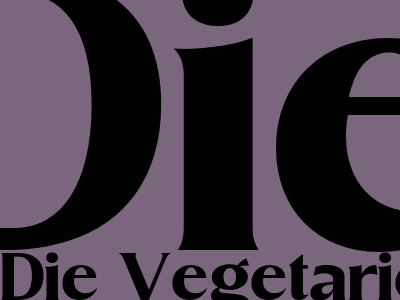Die Vegetarierin: A Deep Dive into Han Kang's Compelling Novel
An Exploration of Female Oppression and Identity
Introduction
Han Kang's Die Vegetarierin, originally published in Korean in 2007, is a profound and unsettling novel that delves into the complexities of female oppression, identity, and the human condition.
The story centers around Yeong-hye, a seemingly ordinary woman who abruptly decides to stop eating meat. This seemingly innocuous act triggers a series of events that rapidly escalate, challenging societal norms and exposing the deep-rooted misogyny and violence inherent in patriarchal societies.
Yeong-hye's Transformation and the Symbolism of Vegetarianism
Yeong-hye's decision to become a vegetarian is not merely a dietary choice; it is a powerful symbol of her rejection of the patriarchal order and her quest for autonomy.
In traditional Korean culture, women are expected to be subservient and to fulfill certain gender roles, including cooking and providing sustenance for their families. By refusing to consume meat, Yeong-hye challenges this expectation and asserts her right to defy imposed norms.
The Escalating Consequences of Yeong-hye's Defiance
Yeong-hye's vegetarianism triggers a series of escalating consequences, both within her family and the wider society.
Her husband, Mr. Cho, is baffled and angered by her decision and attempts to force her to eat meat. The novel depicts the physical and psychological violence that Yeong-hye endures as she resists her husband's control.
Furthermore, Yeong-hye's transformation leads to her isolation from society. She is labeled as "strange" and "unnatural," and her decision is met with incomprehension and hostility from her community.
Yeong-hye's Inner Struggle and the Search for Identity
As Yeong-hye's rebellion intensifies, she embarks on a profound inner journey of self-discovery and identity formation.
Through her experiences, she grapples with questions of agency, freedom, and the meaning of womanhood. She explores the limitations imposed on women by traditional gender roles and societal expectations.
Yeong-hye's transformation ultimately leads to a profound understanding of her own strength and resilience, as well as the importance of resisting oppressive structures.
Themes of Trauma, Loss, and the Nature of Memory
Die Vegetarierin also delves into the themes of trauma, loss, and the nature of memory.
Yeong-hye's experiences of violence and rejection leave lasting psychological wounds. The novel explores the ways in which trauma can shape individual and collective identities and the challenges of healing and reconciliation.
Additionally, the novel examines the complex interplay between memory and forgetting. It raises questions about the reliability of memory and the role it plays in shaping our understanding of the past and present.
Conclusion
Han Kang's Die Vegetarierin is a powerful and thought-provoking novel that offers a nuanced exploration of female oppression, identity, and the human condition.
Through the story of Yeong-hye, the novel challenges patriarchal norms, exposes the violence inherent in society, and invites readers to question their own assumptions about gender and identity.
With its rich symbolism, profound insights, and unflinching portrayal of the human experience, Die Vegetarierin stands as a literary masterpiece that continues to resonate with readers worldwide.

Komentar